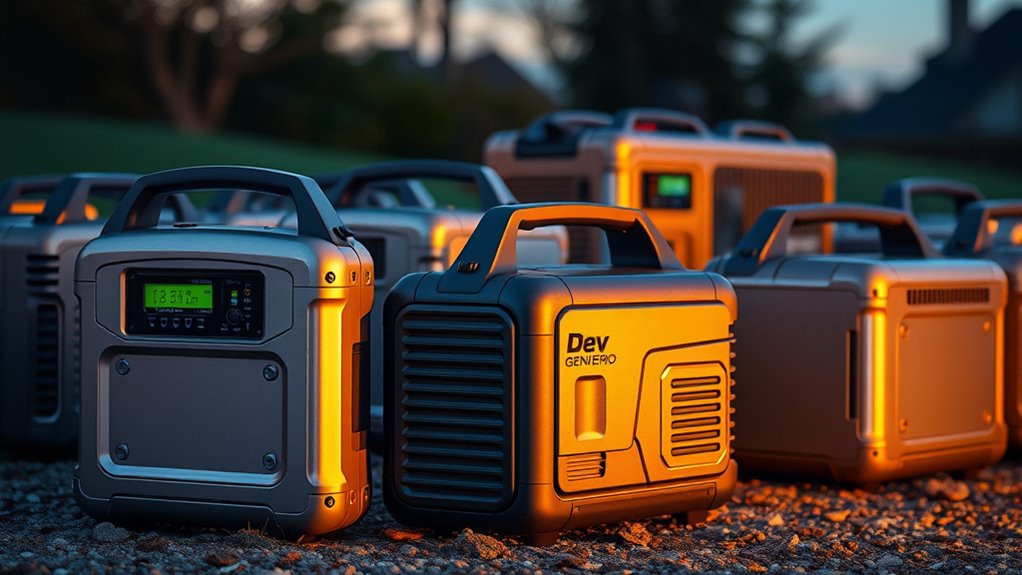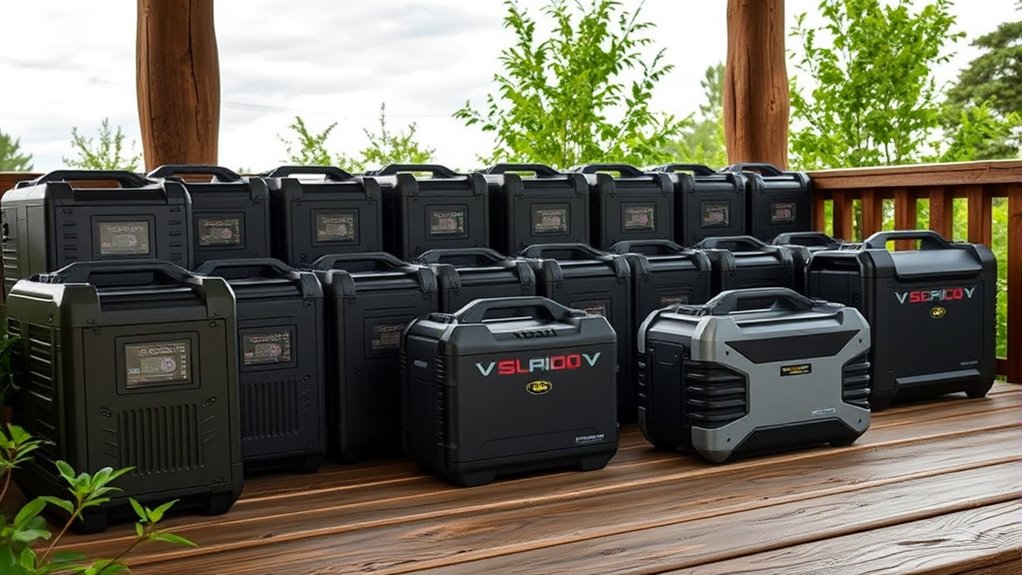If you’re looking for reliable backup power options, there are 15 top battery generators to contemplate. These range from high-capacity units like the EF EcoFlow Delta 2 and Jackery HomePower 3000 to portable, lightweight models like the MARBERO 88Wh and smaller units such as the Portable Power Station 56000mAh. Each offers different capacities, ports, and recharging options to match your needs. Keep going with this overview, and you’ll find the perfect one to keep your power on when outages happen.
Key Takeaways
- High-capacity portable power stations with lithium iron phosphate (LiFePO4) batteries offer long cycle life and reliable backup power.
- Compact, lightweight options are ideal for emergency use, camping, and powering small devices during outages.
- Power stations vary in capacity from around 88Wh to over 3000Wh, supporting different energy needs and appliances.
- Multiple charging methods, including solar, AC, and vehicle, ensure flexibility and quick recharging during power disruptions.
- Diverse port options (AC, USB-C, USB-A, DC) enable powering multiple devices simultaneously in emergency situations.
EF ECOFLOW Portable Power Station DELTA 2
The EF ECOFLOW Portable Power Station DELTA 2 stands out as an excellent choice for anyone needing reliable, portable power on the go. With a 1024Wh LiFePO4 battery, it delivers consistent power for appliances, camping gear, or home backup. Its rapid AC charging—reaching 80% in just 50 minutes—keeps downtime minimal. The device supports solar input up to 500W, making it eco-friendly and perfect for off-grid use. Weighing only 27 pounds, it’s easy to transport, yet built tough for durability. With a maximum inverter power of 2200W and a lifespan exceeding 3000 cycles, it’s a versatile, long-lasting power solution for various needs.
Best For: outdoor enthusiasts, homeowners seeking reliable backup power, and RV travelers needing portable, eco-friendly energy solutions.
Pros:
- Fast AC charging from 0 to 80% in just 50 minutes, minimizing downtime
- High-capacity 1024Wh LiFePO4 battery with over 3000 recharge cycles for long-term use
- Supports solar input up to 500W, enabling eco-friendly off-grid charging
Cons:
- Weighs 27 pounds, which may be heavy for some portable applications
- Limited to 1800W continuous output, which may not suffice for high-power appliances
- May be priced higher compared to basic portable power stations without advanced features
Jackery HomePower 3000 Portable Power Station with Solar Panels
If you’re seeking a reliable backup power source that can handle high-demand appliances and keep essential devices running during outages, the Jackery HomePower 3000 Portable Power Station with Solar Panels stands out. It delivers 3600W continuous power, with a 3072Wh LiFePO4 battery that supports over 4,000 charge cycles. Its compact, portable design includes wheels and a pull handle, making it easy to move. It features seamless UPS switching within 20ms, ensuring critical devices like fridges and medical equipment stay powered. With multiple ports, fast recharging via AC, solar, or vehicle, and built-in AI tech to extend battery life, it’s a versatile, long-term backup solution.
Best For: homeowners, outdoor enthusiasts, and emergency preparedness individuals seeking a reliable, high-capacity portable power station to run essential appliances and devices during outages or off-grid activities.
Pros:
- High continuous power output of 3600W with surge capacity up to 7200W, suitable for high-demand appliances
- Long-lasting LiFePO4 battery with over 4,000 charge cycles and AI-enhanced battery health management
- Versatile charging options including fast recharge via AC, solar panels, or vehicle, with multiple ports for simultaneous device use
Cons:
- Solar panels are sold separately and can be costly, with limited efficiency in overcast conditions
- The overall price point is premium, especially when adding accessories like splitters and extra cables
- The unit’s size and weight, despite being portable, may still be cumbersome for some users to carry or maneuver frequently
Anker SOLIX F2000 Portable Power Station
For anyone seeking a reliable, high-capacity backup power source, the Anker SOLIX F2000 Portable Power Station stands out with its 2400W continuous power and support for up to 12 devices simultaneously. Equipped with LiFePO4 batteries and GaNPrime technology, it offers a 10-year lifespan even with daily use. The HyperFlash feature enables rapid recharging—80% in just 1.4 hours—using AC, car, or solar power. Its versatile ports include AC outlets, USB-C, USB-A, RV, and car outlets, with SurgePad technology handling devices up to 3600W. Plus, it comes with a 5-year warranty, making it a dependable, long-lasting power solution.
Best For: outdoor enthusiasts, homeowners, and RV travelers seeking a reliable, high-capacity portable power source to keep multiple devices charged during outages or outdoor activities.
Pros:
- Supports up to 12 devices simultaneously with versatile ports including AC, USB-C, USB-A, RV, and car outlets
- Rapid recharge capability with HyperFlash technology—80% in just 1.4 hours
- Long-lasting LiFePO4 battery with a 10-year lifespan thanks to InfiniPower technology
Cons:
- Relatively heavy and bulky, which may affect portability for some users
- Higher upfront cost compared to smaller portable power stations
- Limited solar panel compatibility details may require additional research for solar charging setup
MARBERO Portable Power Station 88Wh Camping Lithium Battery
Designed for outdoor enthusiasts and preppers, the MARBERO Portable Power Station 88Wh stands out with its compact size and lightweight build. At just 6.5 x 4.6 x 3.1 inches and 3.2 pounds, it’s easy to carry on camping trips, road adventures, or as a home backup. It features a sturdy ABS case, multiple charging ports, and an adjustable flashlight with SOS mode, lasting up to 68 hours on low. With fast charging from 0 to 80% in 2 hours and support for solar input, it powers small devices like phones, tablets, laptops, and even small appliances, making it a versatile, reliable backup option.
Best For: outdoor enthusiasts, preppers, and anyone needing a portable, lightweight backup power source for small devices and short-term use.
Pros:
- Compact and lightweight design for easy portability
- Fast charging from 0 to 80% in just 2 hours and support for solar input
- Multiple output ports including AC, USB, USB-C PD, and car DC for versatile device charging
Cons:
- Limited capacity (88Wh) restricts powering larger appliances or long-term use
- Slow recharge times for frequent or heavy-duty applications
- Battery performance may decline over time with extended use
Portable Power Station 56000mAh with 2 AC Outlets
The Portable Power Station 56000mAh with 2 AC Outlets stands out as an ideal choice for outdoor enthusiasts and emergency preparedness, thanks to its compact design and powerful battery capacity. Weighing only 6.2 pounds, it’s smaller than a toaster but delivers 300W of continuous power through two AC outlets, supporting devices like laptops, lights, fans, and small refrigerators. With seven ports—including fast-charging USB-C and DC inputs—it offers versatile charging options. Its LiFePO4 battery guarantees safety, longevity, and over 3,500 charge cycles. The built-in LED flashlight and multiple charging methods—AC, car, or solar—make it reliable and ready for outdoor adventures or power outages.
Best For: outdoor enthusiasts, emergency preparedness, and anyone needing portable, reliable power for multiple devices during outdoor trips or power outages.
Pros:
- Compact and lightweight design weighing only 6.2 lbs, making it highly portable.
- Powerful 56000mAh (179.2Wh) LiFePO4 battery with over 3,500 charge cycles ensuring long-term reliability.
- Multiple charging options including AC, car, and solar, with fast-charging capabilities for quick recharging.
Cons:
- Limited to devices rated below 300W, which may not support high-power appliances.
- Slightly higher price point compared to basic portable chargers.
- May require additional adapters or cables for certain device connections.
OUPES Mega 1 Portable Power Station (1024Wh LiFePO4 Battery)
If you need a reliable backup power source that can handle high-watt appliances, the OUPES Mega 1 Portable Power Station stands out with its massive 1024Wh LiFePO4 battery and 2000W continuous output. It powers essentials like refrigerators, CPAP machines, and power tools effortlessly. With 13 versatile outlets—including AC, USB, DC, and car lighter ports—it covers all your needs. Charging options are flexible, supporting solar, AC, or car sources, and it can be expanded up to 5120Wh with an extra battery. Its smart app control, quick recharge, and quiet operation make it a top choice for home backup, camping, and off-grid adventures.
Best For: outdoor enthusiasts, homeowners, and off-grid users seeking a reliable, expandable portable power station for high-watt appliances and emergency backup.
Pros:
- High-capacity 1024Wh LiFePO4 battery with expandability up to 5120Wh for larger energy needs
- Multiple versatile outlets including AC, USB-C, USB-A, DC, and car lighter ports for comprehensive device compatibility
- Fast recharge options via solar, AC, or car, with intelligent app control for remote monitoring and operation
Cons:
- Slightly heavier at 27.8 pounds, which may impact portability for some users
- Proprietary AC power cord for recharging, potentially requiring a spare for convenience
- Noise level of 58dB, which might be noticeable in very quiet indoor environments
Portable Power Station 300W with Solar Generator and Lithium Battery
For anyone seeking a lightweight and portable power solution for outdoor adventures or emergency backup, the GRECELL Portable Power Station 300W with Solar Generator and Lithium Battery stands out. Weighing just 7.3 pounds, it offers 230.88Wh capacity and supports most low- to medium-power devices like laptops, phones, lights, and small appliances. It features six outlets, including an AC pure sine wave port and multiple USB ports, making it versatile. With three recharging options—AC, solar, and car—it’s suitable for off-grid use. Its built-in BMS protects against overloads and short circuits, ensuring safety and longevity, making it an excellent choice for camping or backup power.
Best For: outdoor enthusiasts, campers, and homeowners seeking a reliable, portable power source for low- to medium-power devices and emergency backup.
Pros:
- Lightweight and portable at only 7.3 pounds for easy transport.
- Supports multiple recharging methods including solar, AC, and car outlet.
- Equipped with diverse outlets such as AC, USB-C, USB-A, and car port for versatile device compatibility.
Cons:
- Limited to 150W input power, which may slow down recharging with some chargers.
- Not suitable for high-wattage appliances like heaters or coffee makers.
- Occasional quality control issues reported, including battery reading inaccuracies and charging failures.
Portable Power Station with 297Wh Lithium Battery and 600W AC Output
When I need reliable portable power that can handle a variety of devices, I turn to this power station with a 297Wh lithium battery and 600W AC output. It delivers solid performance with its durable battery, capable of over 800 cycles, and provides stable power through UL certification and built-in protection systems. Charging is flexible—via wall outlet in three hours, car in five, or solar panels (not included). With nine output ports, including USB-C, USB QC 3.0, wireless charging, and AC outlets, it covers most needs. At just 9.7 pounds with a foldable handle, it’s lightweight and perfect for camping, travel, or emergencies.
Best For: outdoor enthusiasts, travelers, and emergency preparedness individuals seeking reliable portable power for various devices.
Pros:
- Compact and lightweight at only 9.7 pounds with a foldable handle for easy transport.
- Multiple charging options including wall outlet, car, and solar panels for versatile use.
- Safe and stable power supply with UL certification and advanced BMS protection system.
Cons:
- Solar panel charging requires additional purchase as panels are not included.
- Limited to 297Wh capacity, which may not suffice for high-power or extended use over long periods.
- Inverter capacity maxes out at 600W, so high-power appliances or motor devices should be avoided.
ALLWEI Portable Power Station 300W
The ALLWEI Portable Power Station 300W is an excellent choice for outdoor enthusiasts and emergency preparedness, thanks to its compact design and versatile charging options. Weighing just 6 pounds, it’s easy to carry and fits in tight spaces. With a 280Wh capacity and 300W rated power, it can run multiple devices simultaneously, including laptops, phones, and small appliances. Its multiple ports—AC outlets, USB-C PD, USB-A, and DC—cover most needs. Charging is flexible, whether via wall outlet, car, or solar panel. Plus, features like a silent cooling fan and SOS mode make it reliable and safe for various outdoor or emergency scenarios.
Best For: outdoor enthusiasts, emergency preppers, and anyone needing reliable portable power for multiple devices in compact spaces.
Pros:
- Lightweight and compact at just 6 pounds, easy to transport and store.
- Supports multiple charging options including AC, car, and solar, offering versatile recharging.
- Multiple output ports including AC, USB-C, USB-A, and DC for powering various devices simultaneously.
Cons:
- Maximum power output limited to 300W, which may not support larger appliances or high-wattage devices.
- Solar panel sold separately, requiring additional purchase for solar recharging.
- Regular charging recommended if unused over three months to maintain optimal battery health.
Anker SOLIX C1000 Gen 2 Portable Power Station
If you need a reliable backup power source that can handle multiple devices simultaneously, the Anker SOLIX C1000 Gen 2 Portable Power Station stands out as an excellent choice. It offers a 2,000W continuous output with a peak of 3,000W and a 1,024Wh capacity, supporting up to 10 devices at once. Its ultra-fast recharging in just 49 minutes via HyperFlash technology and solar recharging in 1.8 hours make it versatile for off-grid use. Compact, lightweight, and built for durability with a LiFePO4 battery, it’s perfect for emergency backup, home, or camping. Plus, smart management features let you monitor and control power easily.
Best For: those seeking a reliable, portable power solution capable of supporting multiple devices simultaneously during emergencies, camping, or home backup.
Pros:
- High power output with 2,000W continuous and 3,000W peak, suitable for various appliances and devices
- UltraFast recharging in just 49 minutes via HyperFlash technology and rapid solar recharge in 1.8 hours
- Durable LiFePO4 battery designed for over 10 years of daily use and 4,000+ charge cycles
Cons:
- May be relatively expensive compared to less feature-rich portable power options
- Requires a high-wattage solar panel (up to 600W) for fastest solar recharging, which might be additional cost
- Large capacity and multiple ports could make it heavier and less portable for some users
EnginStar Portable Power Station 300W (296Wh)
For outdoor enthusiasts and emergency preparedness, the EnginStar Portable Power Station 300W (296Wh) offers a compact and lightweight solution that’s easy to carry in any situation. Weighing just 6.5 pounds and measuring 9 x 5.5 x 7.5 inches, it’s perfect for camping, hunting, or backup power. It features 8 ports, including AC outlets, USB-C, and DC outputs, supporting multiple devices simultaneously. With a 300W pure sine wave inverter and high-quality lithium-ion batteries, it provides safe, stable power for sensitive electronics. Charging options include solar, wall, or car, with a full recharge in about 7 hours. It’s a versatile, reliable backup option.
Best For: outdoor enthusiasts, campers, and emergency preparedness users seeking a portable, reliable power source for multiple devices.
Pros:
- Compact and lightweight design (6.5 pounds, 9 x 5.5 x 7.5 inches) for easy portability
- Multiple charging options including solar, wall, and car, with fast recharge time of approximately 7 hours
- Safe and stable power delivery with pure sine wave AC outlets and advanced battery management system
Cons:
- Solar panel not included, requiring an additional purchase for solar charging
- Limited 300W power output may not support high-wattage appliances simultaneously
- Battery capacity (296Wh) may be insufficient for extended power needs during long outages or remote trips
Portable Power Station 600W 293Wh
Looking for a reliable portable power solution that can handle most daily appliances? The BailiBatt Portable Power Station 600W offers just that. With a 600W pure sine wave AC outlet and a surge capacity of 1200W, it powers devices up to 600W easily. Weighing only 7.7 pounds, it’s perfect for backup, camping, or travel. Its 293Wh lithium battery supports over 1500 charge cycles, ensuring durability. Seven versatile ports—including USB-C, USB, car, and DC—make charging a variety of devices simple. The built-in BMS guarantees safety, and the LCD display keeps you informed. It’s a compact, dependable choice for keeping your essentials powered.
Best For: outdoor enthusiasts, travelers, and homeowners seeking reliable backup power for daily devices and outdoor activities.
Pros:
- Compact and lightweight design (7.7 pounds) makes it highly portable and easy to carry.
- Supports over 1500 charge cycles, ensuring long-term durability and consistent performance.
- Multiple versatile output ports (USB-C, USB, AC, car, DC) for powering a wide range of devices.
Cons:
- Car charger cable is not included, which may require an additional purchase.
- Limited to 600W continuous power output, not suitable for high-power appliances.
- Recharge frequency recommended every 1-2 months when not in use to maintain battery health.
Jackery Portable Power Station Explorer 300
The Jackery Explorer 300 stands out as an ideal choice for outdoor enthusiasts and emergency preppers who need reliable, portable power in a compact package. Weighing just 7.1 pounds, it offers 293Wh of lithium-ion capacity and features two pure sine wave AC outlets, making it safe for sensitive electronics like laptops and cameras. It includes versatile ports—USB-C, USB-A, and a 12V car outlet—allowing multiple devices to charge simultaneously. With fast recharging options via wall, solar, or car power, it’s perfect for camping, travel, or emergencies. Its lightweight, durable design and quick recharge time make it a dependable, easy-to-carry backup power solution.
Best For: outdoor enthusiasts, emergency preppers, and anyone needing portable, reliable power for small devices on the go.
Pros:
- Compact and lightweight design weighing only 7.1 pounds for easy portability
- Multiple versatile ports including AC, USB-C, USB-A, and 12V car outlet for simultaneous device charging
- Fast recharging options via wall, solar, or car power with quick turnaround times
Cons:
- Limited power capacity makes it unsuitable for high-demand appliances like blenders or induction cooktops
- Not designed for heavy-duty or long-duration power needs beyond small electronics and appliances
- The 293Wh capacity may require multiple charges for extended off-grid use in larger devices
2000W Portable Power Station (S2000 Solar Generator)
The 0W Portable Power Station (S2000 Solar Generator) stands out for those needing reliable, high-capacity backup power that can handle multiple devices simultaneously. With a 2000W continuous output and peak of 4000W, it easily powers appliances like microwaves, grills, and hairdryers. Its 1500Wh battery, combined with MPPT technology, guarantees efficient solar charging—fully in 2-3 hours. It features over 10 ports, including AC outlets, USB-C PD 100W, and car sockets, making it versatile for home use, camping, or RV trips. Despite weighing 32 pounds, it’s portable, durable, and equipped with safety features like BMS protection, making it an excellent all-around backup power solution.
Best For: outdoor enthusiasts, homeowners, and travelers seeking reliable, high-capacity portable power to run multiple high-wattage devices and appliances seamlessly.
Pros:
- High continuous power output of 2000W with peak 4000W supports multiple appliances simultaneously
- Fast charging capabilities: fully charges in just 1.5 hours via wall outlet and 2-3 hours with solar panels
- Versatile port selection including AC outlets, USB-C PD 100W, and car socket for various devices
Cons:
- Relatively heavy at 32 pounds, which may affect portability for some users
- Price and availability may vary across retailers, potentially impacting affordability
- Limited to 1500Wh capacity, which may require frequent recharging during extensive use
Portable Power Station Andes 1500 with 1462Wh Battery
If you need a reliable power source for extended off-grid use or backup during outages, the Andes 1500 portable power station is an excellent choice. It charges fully in just 55 minutes, thanks to fast charging, and boasts a 1,496Wh LiFePO4 battery that outperforms typical 1kWh models for longer use. With a 2,400W AC output supporting nearly all household appliances and 13 versatile ports, it’s perfect for RVs, camping, or home backup. Its durable battery maintains over 80% capacity after 6,000 cycles, ensuring long-term reliability. Plus, solar recharging in as little as 3 hours makes it an eco-friendly, sustainable power solution.
Best For: outdoor enthusiasts, RV owners, and homeowners seeking a reliable, eco-friendly backup power source for extended off-grid use or emergency situations.
Pros:
- Fast charging in just 55 minutes with a large 1,496Wh LiFePO4 battery for extended use
- Supports 2,400W AC output and 13 versatile ports compatible with most household appliances and devices
- Durable battery with over 80% capacity after 6,000 cycles ensuring long-term reliability
Cons:
- Relatively heavy and bulky for portable use during transport
- Higher upfront cost compared to smaller or lower-capacity power stations
- Requires compatible solar panels for optimal solar charging (sold separately)
Factors to Consider When Choosing Backup Battery Generators

When choosing a backup battery generator, I focus on my power capacity needs and the types of ports available to match my devices. I also consider how quickly it charges and how portable it is for my situation. Understanding battery chemistry helps me pick a reliable, long-lasting option.
Power Capacity Needs
Choosing the right backup battery generator hinges on understanding your power capacity needs. First, I recommend totaling the wattage of all devices you’ll run simultaneously. This helps guarantee the generator can handle your peak load without overloads. It’s important to differentiate between continuous power and surge wattage—some appliances, like refrigerators or power tools, require higher surge power at startup. Evaluating the battery capacity in watt-hours (Wh) is vital so you know how long the generator can sustain your devices during outages. For high-demand appliances, opt for generators with at least 1800W or more. Also, consider future needs; choosing a model with expandable capacity or higher baseline wattage ensures you won’t outgrow your system as your power needs evolve.
Port Selection Options
Selecting the right backup battery generator involves carefully considering its port options, as these determine how effectively you can power multiple devices simultaneously. Generators come with various outlets, including AC, USB, and DC ports, which influence versatility and convenience. Multiple AC outlets allow you to run larger appliances, while USB ports—especially fast-charging USB-C—speed up device recharging. The placement and accessibility of these ports are also vital, particularly in emergencies or tight spaces. Additionally, some generators support solar panel inputs or other charging sources, requiring specific port types for expandability. The right combination of ports ensures you can connect all your essential devices smoothly and efficiently during outages, making port selection a key factor in choosing a backup generator that truly meets your needs.
Charging Speed Factors
The speed at which a backup battery generator recharges is primarily determined by its input power rating, with higher wattage inputs allowing for faster charging. Units equipped with fast-charging technologies like HyperFlash can go from 0 to 80% in under two hours, minimizing downtime. The type of charging source also impacts recharge time—AC wall outlets are usually the fastest, followed by vehicle ports and solar panels. However, solar charging speed depends on panel wattage and sunlight conditions, often taking several hours under cloudy skies. Additionally, the battery capacity and the charger’s maximum wattage limit set the ceiling for how quickly the generator can recharge. When choosing a backup generator, consider these factors to ensure it meets your needs for rapid recovery during power outages.
Portability and Size
When evaluating backup battery generators, it’s vital to take into account their portability and size to guarantee they fit your specific needs. I recommend checking the weight and dimensions to ensure the unit is easy to transport and store in your designated space. Look for models with handles, wheels, or built-in carrying features that make moving them more manageable. Consider whether the size allows for convenient placement in your vehicle, home, or outdoor setup without taking up excessive space. Keep in mind, smaller, more compact models usually weigh less but may offer lower capacity, so find a good balance between portability and power needs. Larger units tend to be bulkier, which can limit mobility but provide longer-lasting backup power when necessary.
Battery Chemistry Types
Choosing the right battery chemistry for your backup generator is crucial because it directly affects performance, safety, and longevity. Lithium Iron Phosphate (LiFePO4) batteries stand out for their long cycle life, often exceeding 3,000 to 4,000 charge cycles, making them highly durable. In contrast, lithium-ion batteries with NCM chemistry offer higher energy density but typically last around 500 to 1,000 cycles, which may require replacement sooner. Lead-acid batteries are more affordable initially but are heavier, less efficient, and have fewer charge cycles—around 200 to 1,000—making them less ideal for portable use. While solid-state batteries show promise for safety and energy density, they’re still in development. Overall, LiFePO4 is often preferred for its stability and long-term performance.
Expandability Features
Expanding your backup battery system can substantially boost your power capacity, giving you more flexibility during outages. Many systems support modular setups, allowing you to connect extra batteries or modules to increase capacity from around 1kWh up to over 5kWh or more. This flexibility means you can tailor your system to your specific needs, whether for small emergencies or extended outages. Compatibility is key—look for systems with dedicated connection ports, communication protocols, or proprietary hardware that make expansion straightforward. An expandable system is also more cost-effective and sustainable, letting you upgrade gradually instead of replacing the entire unit. This adaptability ensures your backup power remains reliable and scalable as your energy needs grow over time.
Frequently Asked Questions
How Long Can These Generators Power Essential Household Appliances?
It depends on the capacity of the backup battery generator and the appliances you’re running. For example, a small portable unit can power essential devices for a few hours, while larger ones might last several days. I always recommend checking the wattage of your appliances and the generator’s capacity. I’ve found that with proper planning, you can keep crucial appliances like refrigerators and lights running longer during outages.
Are These Generators Suitable for Outdoor or Emergency Use Only?
These generators are versatile, perfect for outdoor adventures or emergency situations. They’re like reliable sidekicks that can handle camping trips, tailgates, or power outages with ease. I’ve used mine in the rain and sun, and it’s never let me down. So, don’t think of them as just emergency gear—they’re your portable power heroes ready for whatever adventure or crisis comes your way.
What Are the Maintenance Requirements for Lithium Battery Backup Generators?
Lithium battery backup generators require minimal maintenance compared to traditional gas models. I make certain to keep the batteries charged and avoid letting them sit completely drained for long periods. It’s essential to keep the unit in a cool, dry place and periodically check for firmware updates if applicable. Regularly inspect connections and vents to ensure everything’s working smoothly, so your backup power is reliable when you need it most.
Can These Generators Be Used Simultaneously With Solar Panels?
Yes, you can use these generators simultaneously with solar panels. I’ve set mine up to work together, and it’s fantastic for maximizing energy efficiency. Just make certain your generator is compatible with solar input and has the right inverter or charge controller. I also recommend confirming that your solar panels are compatible with the generator’s specifications to guarantee smooth operation and ideal power backup during outages.
How Do Temperature Extremes Affect Generator Performance and Battery Life?
They say, “A chain is only as strong as its weakest link,” and temperature extremes test our generators’ limits. Cold weather can reduce battery efficiency and cause sluggish starts, while excessive heat speeds up battery degradation. To keep your backup power reliable, store and operate your generator within recommended temperature ranges. Proper care guarantees your generator remains dependable, no matter how hot or cold it gets outside.
Conclusion
So, there you have it—your very own lineup of backup battery heroes ready to save the day. Because nothing says “prepared” like powering your life through unexpected outages, right? Just remember, while these gadgets might keep your devices alive, they won’t fix the chaos outside. But hey, at least you’ll be the one laughing in the dark, smugly knowing you’re partly in control. Stay powered up, my friend—because having options beats being left powerless!










